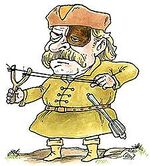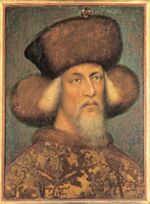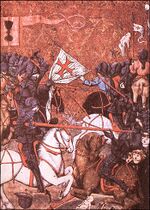Hussite Wars
The Hussite wars took place somewhere in Europe between 1420 and 1436 as a result of Czechs demanding something to drink after eating a hostia in church, because the hostiae were very hard to swallow. A priest called Jan Hus suggested that a little sip of wine should solve the problem. The evil Catholics, however, disagreed, forcing Hus' followers to force them to. This took several decades of fighting and fucking up the entire country.
The foreplay[edit]

Hus, from the Catholic point of view, was a disgusting heretic swine. Not only he suggested - and eventually even realised it - that drinking wine in church wasn't a bad idea but he also criticised the Catholic Church as a whole for its greediness. Pope Oscarius XI. got pissed and ordered Hus to call back his words. Hus was invited to the Pope's mansion for a friendly barbecue afternoon. However, after he refused to give up his beliefs, the Swiss guard grabbed him and burned him at the steak.
The reaction back home was instant - as Hus provided the poor with free booze every Sunday and now he was gone, every drunkard in Prague turned his wrath agaist those, who were responsible for it - Catholics, Germans, Jews, gypsies and all the other usual pogromisable folks. The Hussite wars began.
First stages[edit]

The real fun began with the First defenestration of Prague where radical hussite alcoholics, in desperate search of something to drink, threw several noblemen from the town hall's windows and finished them off with spears and scythes. Czech king Wenceslaw IV. wanted to avenge the dead but had himself died only a few days afterwards, leaving the coutry without a ruler. The hussites welcomed this situation with massive celebrations and started to spread the Word across the country. Soon, the entire Czech lands were Utraquist - from latin sub utraque specie meaning "getting drunk in church ist krieg!"
Several noblemen, mostly those with a doctor's order not to drink, remained Catholic. This caused them several minor inconviniences, for example their castles being burnt down, their wives and daughters raped, their riches stolen and themselves hanging on the nearest tree. The same happened to all Catholic churches, monasteries, abbeys, cathedrals and whatever else they had. The hussite priority number one was to pillage and loot as much as they could to obtain gold and spend it for wine.
Inside the hussite movement, several fractions of beer-lovers, led by Jan 'One-eye-later-no-eyes' Žižka left Prague for a week or two of camping in the woods. They liked their camping place so much that they've decided to stay there, founding a new city and calling it Tábor (Czech for "sleeping in forests and eating acorns ist also krieg!"
Another fraction, the Adamites, also known as Picards or Beghards, as if you cared, took it all to the extreme and the founded a community where they shared property and women - an early attempt to live in communism, long before Marx was even mature. Žižka and his soldiers soon came and slaughtered them all because their behaviour was not Christian at all.
The empire strikes back[edit]

The revolution did not exactly please His Imperial Majesty Sigismund I. the Very Hairy Red Fox, Holy Roman Emperor and king of many little countries as he was de iure the Czech king. Although it doesn't seem so today, back in the old days, Bohemia was quite something and there were millions of gold coins - I would mention their name but you don't care anyway, do you - that could, but did not, flow into the imperial treasury from taxes. The Pope in Rome wasn't pleased either, as them heretics killed many of his clergy pimps and stole the Church's treasures. The outcome was evident - if two powerful men get angry at the same party and at least one of them is a Pope, there ought to be a crusade. Kriiiieg!
Hussite army, insignia and tactics[edit]
The army was unique in many ways. Firstly, as the hussite movement became very popular in the countryside, many peasants would join the army. However, a poor peasant had no time and money to buy a proper weapon and train, therefore they armed themselves with what they had at home - flails, scythes, hammers, sticks or spears, the average tools of a humble countryman. Many made themselves a pavise, something like a very, very big shield. The richer could afford to buy a hand cannon and even some quality armor. There were knights among the ranks, however, the backbone of the hussite armies was always rural infantry.

Hussite insignia is very simple - a chalice. What is a chalice? A chalice, my friend, is a goblet from which you drink wine in church. It's got something to do with the Holy Grail but who cares anyway. What is important is the fact that commanders would give out merit badges with tiny little chalices on them, very similar to what Boy Scouts of America do. Or at least a bit similar. A tiny little bit.
Hussites always used the same tactics in battle. They built themselves a fortification of war wagons strapped together and waited for the enemy to attack. Assaults would be fended off with rapid gunfire (hand cannons, howitzers, bombards) and polearms (used on those who managed not to get shot during the charge). As soon as the enemy turns around and starts to flee, light cavalry, hiding inside the corral, would ride out a hack the poor fleeing soldiers from behind. Stupid crusaders never ever found a way to beat this absolutely simple a very predictable way of fighting. Ironically enough, it was the hussites who defeated the hussites in their last battle. But we'll get to that later.
The first crusade[edit]
With their weapons blessed by the Pope, soldiers of many - mostly German - aristocrats attacked the Czech lands. After burning down several villages and unsuccessfully laying siege to the city of Žatec, the Hussite counterattack came. Utraquist troops came into the crusaders' line of sight, sang a cacophonic war song Ktož jsú boží bojovníci which caused the Germans to flee in panic. The Hussites returned home and celebrated.
The second crusade[edit]
With their weapons blessed by the Pope, soldiers of many - mostly German - aristocrats attacked the Czech lands. After burning down several villages and unsuccessfully laying siege to the city of Žatec, the Hussite counterattack came. Utraquist troops came into the crusaders' line of sight, sang a cacophonic war song Ktož jsú boží bojovníci which caused the Germans to flee in panic. The Hussites returned home and celebrated.
The third crusade[edit]
With their weapons blessed by the Pope, soldiers of many - mostly German - aristocrats attacked the Czech lands. After burning down several villages and unsuccessfully laying siege to the city of Žatec, the Hussite counterattack came. Utraquist troops came into the crusaders' line of sight, sang a cacophonic war song Ktož jsú boží bojovníci which caused the Germans to flee in panic. The Hussites returned home and celebrated.
The fourth crusade[edit]
With their weapons blessed by the Pope, soldiers of many - mostly German - aristocrats attacked the Czech lands. After burning down several villages, they were surprised by the pressence of Hussite troops in Žatec. The heretics sang a cacophonic war song Ktož jsú boží bojovníci which caused the Germans to flee in panic. The Hussites returned home and celebrated.
The fifth crusade[edit]
With their weapons blessed by the Pope, soldiers of many - mostly German - aristocrats attacked the Czech lands. After burning down several villages, they were ambushed by Hussite partisans who, hiding in bushes or behind trees, sang a cacophonic war song Ktož jsú boží bojovníci which caused the Germans to flee in panic. The Hussites returned home and celebrated.
The sixth crusade[edit]
With their weapons blessed by the Pope, soldiers of several - mostly German - aristocrats attacked the Czech lands. They planned to burn down several villages but the Hussites, who were waiting for them at the border, sang a cacophonic war song Ktož jsú boží bojovníci which caused the Germans to flee in panic. The Hussites returned home and celebrated.
The seventh crusade[edit]
With their weapons blessed by absolutely nobody, soldiers of a few German aristocrats attacked the Czech lands. After burning down several villages, the cities of Žatec, Tábor, Prague and many more, the army eventually found itself on Chinese borders. Returning home with hands full of loot from all the counquered countries, the tired soldiers ran into patiently waiting Hussite troops who sang a cacophonic war song Ktož jsú boží bojovníci which caused the Germans to flee in panic, leaving all their pilaged riches behind. The Hussites returned home and celebrated.
The eighth crusade[edit]
With their weapons blessed again by the Pope, soldiers of many - mostly German - aristocrats attacked the Czech lands. Even after they burned down several villages and besieged the city of Žatec, the Hussites did not sing anything at all. This caused the Germans to flee in panic. The Hussites returned home and celebrated.
The ninth crusade[edit]
- Ktož jsú booooooooožíííííííí bojovnííííííciiiiiiii - Hans, du Scheisskopf, schnell! Schneeell!!
The tenth crusade[edit]
With their weapons blessed by their wine, soldiers of many Czech field commanders attacked Germany. After burning down several villages, the German counterattack came. The Germans attempted to scare the enemy by singing an unspecified song by Rammstein but were outvoiced by a Czech cacophonic war song Ktož jsú boží bojovníci which caused them to flee in panic. The Hussites destroyed their cities, slaughtered their children, stole their property, returned home and celebrated.
The aftermath[edit]
After these sorry episodes, nobody wanted to fight anymore and politicians took over the issue. In several weeks, the Hussite movement was in ruins and two opposing factions fought agains each other in the Battle of Lipany where they wiped each other out.
